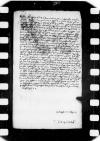Cum puer meus a Reverendissime Dominatione Vestra rediret, commodum apud me diversabantur dominus ⌊castellanus Gedanensis⌋ et dominus ⌊Ioannes a Werden⌋, quos mihi viciniores ego ad huius Natalis Dominici celebritatem peragendam invitaveram. Cum ⌊his⌋ communicavi consilium Reverendissimae Dominationis Vestrae de litteris scribendis a duobus nobis ad
s(erenissimam) or s(acram)⌈s(erenissimam)s(erenissimam) or s(acram)⌉
⌊regiam maiestatem⌋, in quod ego pedibus ieram, sunt et ipsi illud, ut optimum, amplexi. Quapropter nihil sum cunctatus manum meam Vestrae Reverendissimae Dominationis manui iungere in subscriptione litterarum, quas ab ipsa Reverendissima Dominatione Vestra signandas, ut ablegentur, remitto, daturus et ad magnificum dominum palatinum Pomeraniae illarum exemplum, forte etiam ad Thorunensem senatum, si referet. Consilium domini ⌊castellani Gedanensis⌋ de transferenda accisa orig. axisa⌈accisaaccisa orig. axisa⌉ in alterum annum probarem, si temporius in manus sumptum fuisset. Nunc nec iniri mature de hac re consilium potest nec revocari, quod apud plerosque iam in cursu est. De moneta adulterina dilatum longius consilium non potest non maximam invehere nostrae reipublicae perniciem. Illustrissimus ⌊dominus dux⌋, ut audio, proxima hebdomade ad sua regredietur. Apud hunc, ut Reverendissima Dominatio Vestra ordiatur hanc querelam, consulo atque rogo. Inde de agendis apud principes nostros nobis ministrabitur consilium. Quod Reverendissima Dominatio Vestra non est gravata in negotio ecclesiae meae priori scriptioni addere, alteram ad nepotem suum, habeo plurimam gratiam. Huic etiam oeconomi mei causam commendandam esse, erat mihi persuasissimum. Verum cum dominus iudex Culmensis principio huius tragoediae palam iactaret se inscio canonicatum illum ⌊Martini Czeme⌋ ab ipso nepote Reverendissimae Dominationis Vestrae pro filio impetratum esse, qui hunc etiam in lite patronum esset habiturus, maluit meus oeconomus qualemcumque sibi asciscere procuratorem, quam deserta causa periclitari, cui consilio nec ego deesse potui, malens interim transactione aliqua, quam lite causam terminari, usus in hac re etiam Vestrae Reverendissimae Dominationis {Vestrae} opera apud iudicem Culmensem, qui, quam fidem in conventis praestet, Reverendissima Dominatio Vestra aliquando intelliget. Novarum rerum nihildum hic novus annus huc attulit, praeter ea, quae hospites mei referunt, Vestrae Reverendissimae Dominationi non ignota, quae posthac in mercatum advenient, non negligem exponere Reverendissimae Dominationi Vestrae. Cui me diligentissime meaque omnia commendo, optans illi cum longaeva incolumitate faustissimos rerum omnium successus.


 AAWO, AB, D.2, f. 138v
AAWO, AB, D.2, f. 138v